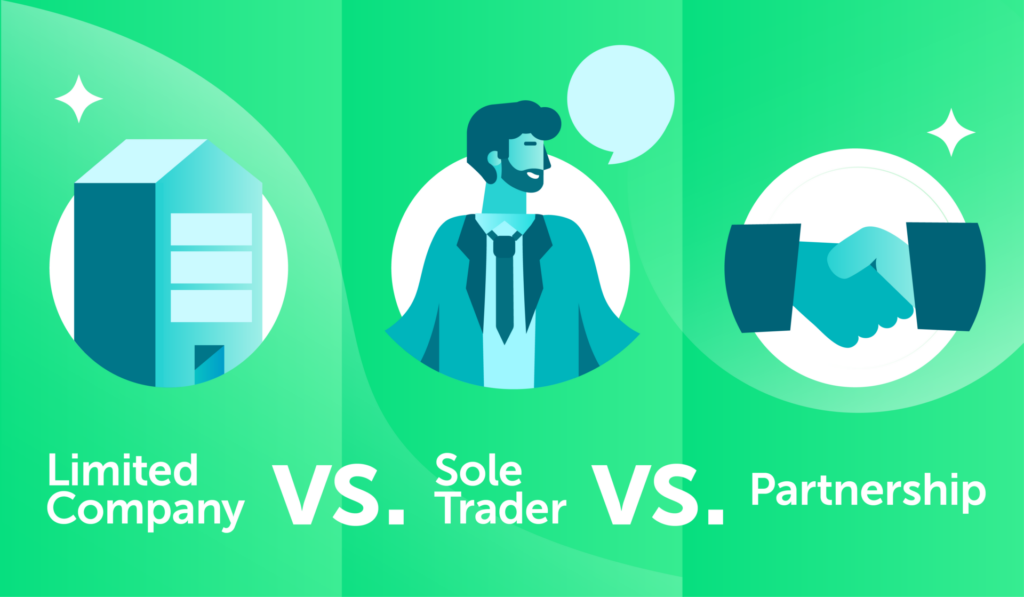
Limited Company vs. Sole Trade vs. Partnership - Ad Valorem
4 minutes
Limited Company vs. Sole Trade vs. Partnership
Choosing the Right Structure for Your Business
When starting a business, one of the most critical decisions entrepreneurs face is choosing the right business structure. The three most common options are Limited Company, Sole Trader, and Partnership. Each structure comes with its unique advantages and disadvantages, and understanding their differences is vital to making an informed choice that aligns with your business. Whilst tax can be an important part of an informed choice, it must not be the only consideration.
Limited Company:
A Limited Company is a separate legal entity from its owners, offering the most robust form of business structure. It provides limited liability protection, which means the shareholders’ personal assets are generally shielded from business debts and liabilities. Here are some key points to consider:
Pros:
- Limited liability protection: Shareholders’ personal assets are generally protected, reducing personal financial risk.
- Credibility: A Limited Company often conveys a sense of professionalism and trustworthiness to clients, suppliers, and investors.
- Transfer of ownership: Ownership in a Limited Company can be transferred through the transfer/sale of shares.
- Tax efficiency: Limited Companies have access to certain tax benefits and allowances, such as R&D tax credits, and dividends, which would not available to Sole Traders and Partnerships.
Cons:
- Set-up and administration: Registering and maintaining a Limited Company involves more paperwork and compliance requirements.
- Higher costs: Incorporation fees and ongoing administrative expenses may be higher than other structures.
- Less privacy: A Limited Company’s ownership structure and financial accounts are often publicly accessible.
Sole Trader:
A Sole Trader is the simplest form of business structure, where the individual is the business itself. This structure is particularly suitable for small businesses and self-employed individuals.
Pros:
- Easy setup: Establishing a Sole Trader business is straightforward, with minimal legal formalities and lower costs.
- Full control: As the sole owner, you have complete control over decision-making and operations.
- Lower tax complexity: Tax reporting is generally simpler compared to other structures.
Cons:
- Unlimited liability: As a Sole Trader, you are personally liable for all business debts and obligations, putting personal assets at risk.
- Limited access to capital: Sole Traders may find it challenging to secure significant investments or loans due to the perceived higher risk.
- Limited growth potential: The structure may not be conducive to attracting top talent or expanding the business significantly.
Partnership:
A Partnership is a business structure involving two or more individuals who share the responsibilities, profits, and liabilities of the business.
Pros:
- Shared responsibility: Partners can combine their skills, expertise, and resources for the benefit of the business.
- Lower setup costs: Registering a partnership requires fewer legal formalities than a Limited Company.
- Tax flexibility: Partnerships can pass profits and losses directly to individual partners, leading to potentially more flexibility with tax treatment.
Cons:
- Unlimited liability: Similar to Sole Traders, partners are personally liable for the business debts and obligations.
- Interpersonal conflicts: Disagreements between partners can arise, potentially leading to business disruptions. It is always recommended that a Partnership Agreement is put in place, which should covers situations when disputes happen.
- Limited life span: A partnership’s continuity may be affected by changes in the Partnership Agreement or the departure of a partner.
Choosing the right business structure is crucial for the long-term success of your venture. Consider your risk tolerance, growth aspirations, financial situation, and future plans before making a decision. Additionally, seek advice from accounting professionals to ensure you fully understand the legal and tax implications of each structure.
If you are thinking of starting a business or restructuring your existing business, get in touch and we’d be happy to talk through the options available to you. Remember, the right decision will not only define the way your business operates but also impact your personal liabilities, taxation, and growth prospects in the years to come.
(E) enquiries@advaloremgroup.uk (T) 01908 219100 (W) advaloremgroup.uk






